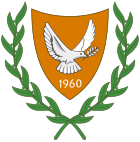
The Progressive Party of Working People is a Marxist–Leninist communist party in Cyprus.

Efstathios "Tassos" Nikolaou Papadopoulos was a Cypriot politician and barrister, who served as President of Cyprus from 2003 to 2008.
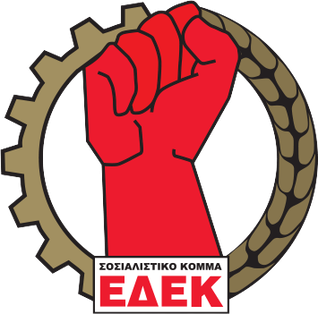
The EDEK Socialist Party is a Greek Cypriot nationalist, social-democratic political party in Cyprus.

The Democratic Party is a Greek-Cypriot nationalist, centrist political party in Cyprus founded in 1976 by Spyros Kyprianou.
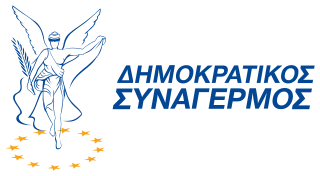
The Democratic Rally is a Christian democratic and liberal-conservative political party in Cyprus led by Annita Demetriou. The party was founded on 4 July 1976 by veteran politician Glafcos Clerides. Two leaders of the party have served as presidents of Cyprus, Clerides from 1993 until 2003 and Nicos Anastasiades from 2013 to 2023.

Ioannis Kasoulides is a Cypriot politician, party member of DISY and Minister of Foreign Affairs of Cyprus. He has served in the same position from 1997 until 2003, and again from 2013 to 2018. He was member of the European Parliament from 2004 until 2013. He has held a number of political posts in Cyprus, including member of the House of Representatives of Cyprus from 1991 until 1993, and government spokesman from 1993 until 1997.

At the national level, the Republic of Cyprus holds elections for its head of state, the President of Cyprus, and for its legislature, the House of Representatives.
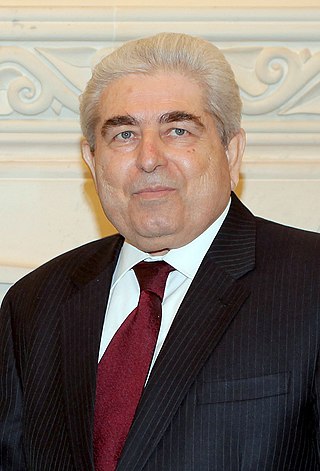
Demetris Christofias was a Cypriot politician, who served President of Cyprus from 2008 to 2013. He was previously President of the House of Representatives from 2001 to 2008 and General Secretary of the Progressive Party of Working People from 1988 to 2009.

Vassos Lyssarides was a Cypriot politician and physician who was a central figure in the politics of Cyprus after the island's independence.
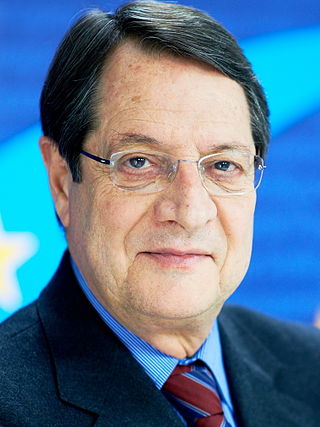
Parliamentary elections were held in Cyprus on 22 May 2011 to elect the 56 Members of the House of Representatives. They were won by the Democratic Rally, who increased their seats from 18 to 20. The governing Progressive Party of Working People also gained a seat, bringing them up to 19. The Democratic Party lost two of their 11 seats and the European Party lost one of their three seats. The Movement for Social Democracy held on to their five seats.
Antonis Paschalides also Antonios is a Greek Cypriot lawyer and politician member of DIKO. On 29 February 2008 he was appointed by the President of the Republic of Cyprus as Minister of Commerce, Industry and Tourism, a position he held until 2019.
Akis Cleanthous was a Cypriot politician and financial analyst. Cleanhous served as the chairman of the Cyprus Stock Exchange from 2003 to 2007 and Minister of Education and Culture from 2007 until 2008. He was a member of the Democratic Party (DIKO), a center-right political party.

Parliamentary elections were held in Cyprus on 5 September 1976. The elections were contested by two alliances; one consisting of the Democratic Front (DIKO), the Progressive Party of Working People (AKEL) and the Movement for Social Democracy (EDEK) and one consisting of the Democratic National Party (DEK) and Democratic Rally (DISY).

Presidential elections were held in Cyprus on 17 February 2013. A runoff was held on 24 February 2013. Nicos Anastasiades of Democratic Rally won the election. The other candidates were Stavros Malas of the Progressive Party of Working People (AKEL); Praxoula Antoniadou of the United Democrats; Lakis Ioannou with the support of LASOK; Loukas Stavrou; ELAM's Giorgos Charalambous, Giorgos Lillikas of Movement for Social Democracy (EDEK); and independents Andreas Efstratiou, Makaria-Andri Stylianou, Kostas Kyriacou(Outopos) and Solon Gregoriou. Although the president Demetris Christofias was not term-limited, he did not seek re-election in 2013.
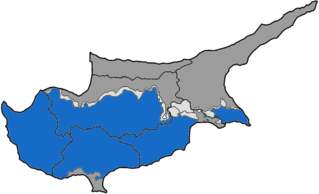
Cyprus's component of the 2014 European Parliament election was held on Sunday, 25 May 2014.
The following events occurred in the Republic of Cyprus during the year 2008.

Parliamentary elections were held in Cyprus on 22 May 2016 to elect 56 of the 80 Members of the House of Representatives.

Presidential elections were held in Cyprus on 28 January 2018. As no candidate received a majority of the vote in the first round, a run-off was held on 4 February between the top two candidates, incumbent President Nicos Anastasiades of the Democratic Rally (DISY) and Stavros Malas of the Progressive Party of Working People. Anastasiades emerged as the winner with 55.99% of the vote.

Presidential elections were held in Cyprus on 5 February 2023. No candidate received a majority of the vote in the first round, so a runoff was held on 12 February. Incumbent president Nicos Anastasiades of the Democratic Rally (DISY), who won the presidential elections in 2013 and 2018, was ineligible to run due to the two-term limit mandated by the Constitution of Cyprus.
